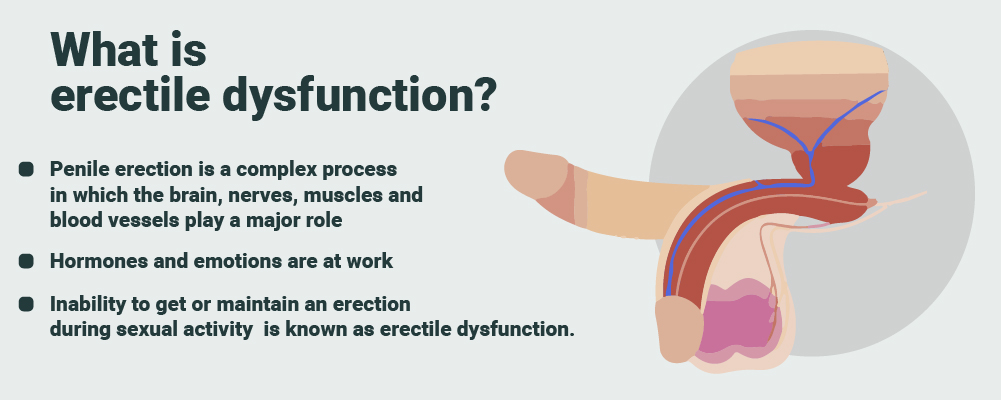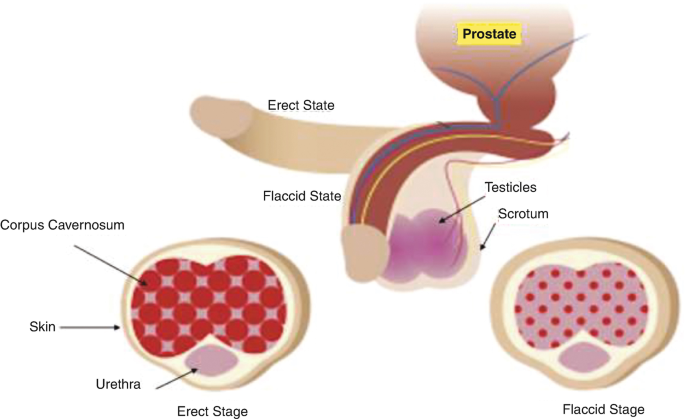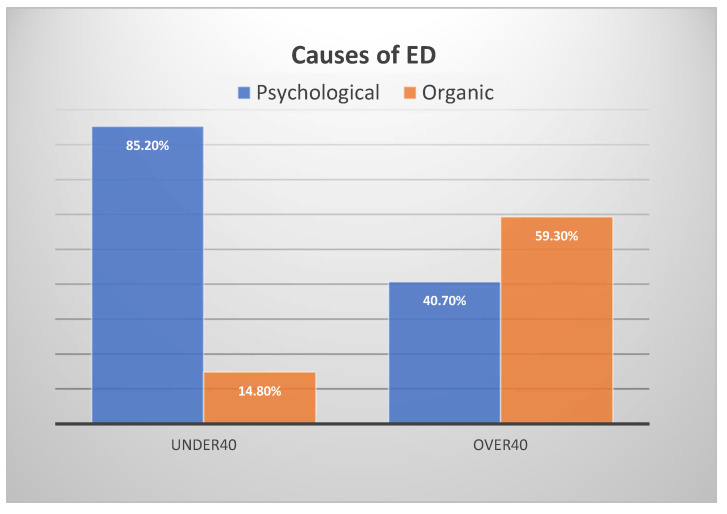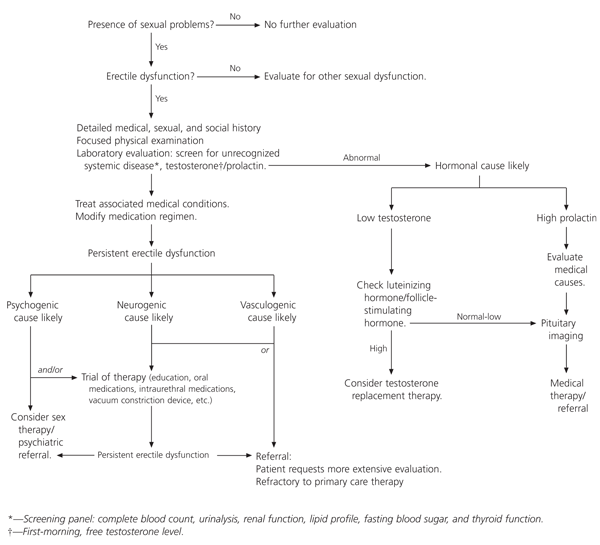Demystifying Erectile Dysfunction: Causes and Solutions

Understanding Erectile Dysfunction: An Overview
Erectile dysfunction (ED) is a common medical condition that affects millions of men worldwide. It is characterized by the inability to achieve or maintain an erection sufficient for sexual activity. While occasional difficulty with erections is normal, persistent issues can be distressing and may indicate an underlying health concern.

ED can occur at any age, although it becomes more common as men get older. It is estimated that approximately 5% of men in their 40s experience ED, while the prevalence increases to around 15% in men in their 70s. However, it is important to note that ED is not an inevitable part of aging and can affect younger men as well.
There are several factors that can contribute to the development of ED. These include physical causes such as chronic health conditions (e.g., diabetes, cardiovascular disease), hormonal imbalances, and certain medications. Psychological factors, such as stress, anxiety, depression, and relationship issues, can also play a significant role in the development of ED.
If you are experiencing symptoms of ED, it is essential to seek medical assistance. A healthcare professional will review your medical history, conduct a physical examination, and may recommend additional tests to determine the underlying cause. Treatment options for ED range from lifestyle changes (e.g., exercise, healthy diet) to medication and other interventions.
In this article, we will explore the various factors that contribute to the development of ED, as well as the available treatment options. By understanding the causes and potential solutions, individuals affected by ED can take proactive steps towards improving their sexual health and overall well-being.
The Male Anatomy and Erectile Function

The male anatomy plays a crucial role in the process of erectile function. Understanding how the male reproductive system functions can help shed light on the causes and treatment options for erectile dysfunction.
At the core of the male anatomy is the penis, which consists of spongy tissue called the corpus cavernosum. This tissue contains numerous blood vessels and is responsible for producing an erection. When a man becomes sexually aroused, the brain sends signals to the arteries in the penis to relax and allow more blood to flow in. As this happens, the spongy tissue fills with blood, causing the penis to become erect.
Several key components work together to facilitate this process. The nervous system plays a vital role in transmitting signals from the brain to the penis, while hormones and blood vessels also contribute to the erectile response. Any disruption in these intricate mechanisms can lead to difficulties in achieving or maintaining an erection. Understanding the male anatomy and its connection to erectile function is fundamental in diagnosing and treating erectile dysfunction effectively.
Psychological Factors That Can Contribute to Erectile Dysfunction
Psychological factors can play a significant role in contributing to erectile dysfunction (ED). The mind and body are closely interconnected, and various emotional and psychological issues can interfere with sexual functioning. Stress, anxiety, depression, and relationship problems are among the most common psychological factors that can impact a man’s ability to achieve or maintain an erection.
Stress, whether related to work, finances, or personal issues, can trigger a physiological response in the body that can interfere with sexual arousal and performance. Anxiety, on the other hand, can create a sense of apprehension and worry, leading to difficulties in obtaining an erection. Depression, a mood disorder characterized by persistent feelings of sadness, can also affect sexual desire and function.
Relationship problems, such as unresolved conflicts, communication issues, or lack of intimacy, can significantly impact a man’s ability to achieve and maintain an erection. Emotional distance or unresolved emotional issues can create a sense of disconnect between partners, leading to sexual difficulties.

A Study published in journal of clinical practice highlights a significant proportion (85.2%) of men under 40 experiencing psychogenic ED as the primary occurrence, contrasting with older age groups where biological causes are more prevalent.
It is important to address these psychological factors to effectively manage and treat erectile dysfunction. Seeking professional help from a therapist, counselor, or sex therapist can be beneficial in addressing the underlying emotional issues and developing strategies to improve sexual functioning. Additionally, open and honest communication with your partner can help foster understanding, support, and intimacy, which are essential components in overcoming the psychological challenges associated with erectile dysfunction.
Lifestyle Habits and Their Impact on Erectile Function
Lifestyle habits play a significant role in the overall health and well-being of individuals. When it comes to erectile function, certain lifestyle habits can have a direct impact on sexual performance. It is essential to be aware of these habits and make necessary changes to maintain a healthy erectile function.
One of the key lifestyle habits that can affect erectile function is smoking. According to a study published in the Journal of Sexual Medicine, smoking can impair erectile function by affecting the blood flow to the penis. The toxins in cigarettes can damage the blood vessels, leading to reduced blood flow and difficulties in achieving or maintaining an erection. Quitting smoking can significantly improve erectile function and overall sexual health.
Another lifestyle habit that can impact erectile function is excessive alcohol consumption. While alcohol may initially have a temporary stimulating effect, chronic and excessive alcohol use can lead to long-term erectile dysfunction. Alcohol affects the nervous system and can interfere with the signals sent from the brain to the penis, inhibiting proper erectile function. Limiting alcohol intake to moderate levels or abstaining from it altogether can help improve sexual performance.
Furthermore, physical inactivity and a sedentary lifestyle can contribute to erectile dysfunction. Regular exercise has been shown to improve blood circulation, boost testosterone levels, and enhance overall cardiovascular health. Engaging in moderate-intensity aerobic exercises such as brisk walking, swimming, or cycling can help improve erectile function. Additionally, maintaining a healthy weight through a balanced diet and regular exercise can also have a positive impact on sexual performance.
Here is a table of articles that summarizes scientific articles on : Lifestyle Habits and Their Impact on Erectile Function.
Sure, I can create a table of scientific articles for you. Here is what I found:
| Title | Authors | Year | Journal | Summary |
|---|---|---|---|---|
| How Lifestyle Factors Influence Erectile Dysfunction1 | Medicover Hospitals | 2023 | Medicover Hospitals Blog | The article discusses how smoking, diet, physical inactivity, alcohol consumption, and stress can affect erectile function and provides some tips to improve lifestyle habits and sexual wellness. |
| How Healthy Lifestyle Habits Can Help Cope with Erectile Dysfunction?2 | BeatO | 2023 | Diabetes Blog | The article explores the link between lifestyle and ED and highlights how adopting a balanced diet, regular exercise, stress management, and limiting alcohol and smoking can contribute to improving erectile function and overall sexual health. |
| Physical Activity and Erectile Dysfunction in Middle-Aged Men3 | Esposito K, Giugliano F, Di Palo C, et al. | 2022 | Journal of Andrology | The article reports the results of a randomized controlled trial that showed that physical activity combined with a Mediterranean diet improved erectile function in men with metabolic syndrome. |
In conclusion, lifestyle habits can play a significant role in erectile function. Quitting smoking, reducing alcohol consumption, and maintaining a physically active lifestyle are all essential steps in promoting healthy erectile function. By making these positive changes, individuals can potentially enhance their sexual health and overall well-being.
Chronic Health Conditions Linked to Erectile Dysfunction
Chronic health conditions can have a significant impact on a man’s sexual health, including the ability to achieve and maintain an erection. Several medical conditions have been linked to erectile dysfunction, highlighting the importance of addressing these underlying health issues.
One such condition is cardiovascular disease, which refers to a range of disorders that affect the heart and blood vessels. Research has shown that men with cardiovascular disease are more likely to experience erectile dysfunction. This connection can be attributed to the fact that both conditions share common risk factors such as obesity, high blood pressure, and high cholesterol levels. Additionally, the reduced blood flow to the penis caused by narrowed or blocked blood vessels can contribute to erectile dysfunction.
Another chronic condition that can impact erectile function is diabetes. Diabetes can damage nerves and blood vessels, leading to reduced blood flow to the penis and nerve damage that affects the ability to achieve an erection. Studies have found that up to 75% of men with diabetes experience some degree of erectile dysfunction. Proper management of blood sugar levels and regular monitoring can help prevent or minimize the impact of diabetes on sexual function.
It is important to note that chronic health conditions and erectile dysfunction often go hand in hand, creating a complex interplay that can further affect a man’s overall well-being. Understanding and addressing these underlying health issues is crucial in managing and treating erectile dysfunction effectively. Consulting with a healthcare professional is essential in developing a personalized treatment plan that takes into account the individual’s specific health condition and needs. By addressing these chronic health conditions, men can improve their overall health and regain their sexual confidence.
Medications and Erectile Dysfunction: Unveiling the Connection
Understanding the connection between medications and erectile dysfunction (ED) is crucial for individuals who may be experiencing this condition or are concerned about its potential impact on their sexual health. While certain medications have been associated with the development or exacerbation of ED, it is important to note that not all medications have this effect. By exploring the relationship between certain drugs and erectile function, individuals can gain a deeper understanding of how their medication regimen may impact their sexual health.
Several classes of medications have been linked to the occurrence or aggravation of ED. For instance, certain antidepressants, such as selective serotonin re-uptake inhibitors (SSRIs), can affect erectile function by altering neurotransmitters in the brain. Similarly, anti-psychotic medications commonly used to manage conditions like schizophrenia and bipolar disorder have been associated with a higher risk of developing ED. Additionally, medications used to treat high blood pressure, including beta-blockers and diuretics, have been reported to impact erectile function by lowering blood flow to the penis. It is important to note that the extent and prevalence of these effects may vary among individuals, and consulting with a healthcare professional is essential to fully understand the potential impact of specific medications on one’s sexual health.
As individuals seek treatment for various medical conditions, it is imperative for healthcare providers to engage in open and honest discussions about the potential effects of prescribed medications on sexual function. By fostering a patient-centered approach, medical professionals can address concerns and provide alternatives or adjustments when necessary. Together, patients and healthcare providers can navigate the complex relationship between medications and erectile dysfunction, ensuring the best possible outcomes for both physical and sexual well-being.
Hormonal Imbalances and Erectile Dysfunction
Hormonal imbalances can play a significant role in the development of erectile dysfunction (ED) in men. Testosterone, the primary male sex hormone, is essential for maintaining proper erectile function. When hormone levels become imbalanced, it can affect a man’s ability to achieve or sustain an erection.
One common hormonal imbalance that can contribute to ED is low testosterone levels, also known as hypogonadism. Studies have shown that men with low testosterone are more likely to experience difficulties with erectile function. Additionally, conditions such as obesity, diabetes, and certain medications can disrupt the body’s hormone balance, further exacerbating the problem. It is crucial to seek medical guidance if you suspect a hormonal imbalance may be contributing to your ED, as hormonal replacement therapy may help restore proper function and alleviate symptoms.
The Role of Age in Erectile Dysfunction
As men age, it is natural for them to experience changes in their sexual function. One common concern that may arise is erectile dysfunction (ED). While ED can affect men of all ages, it becomes more prevalent with increasing age. According to a study published in the Journal of Sexual Medicine, the prevalence of ED increases from approximately 2% in men aged 40-49 to about 53% in men aged 70 and older.
Several factors contribute to the association between age and ED. Firstly, as men age, there is a decline in the production of testosterone, the primary sex hormone responsible for maintaining erections. Testosterone plays a crucial role in stimulating the production of nitric oxide, a chemical that relaxes the smooth muscles in the penis, allowing for increased blood flow and the achievement of an erection. Therefore, lower testosterone levels can potentially lead to difficulties in achieving and maintaining an erection.
Additionally, aging is often accompanied by the presence of underlying chronic health conditions such as diabetes, hypertension, and cardiovascular disease. These conditions can have a negative impact on erectile function and further contribute to the development of ED. In fact, a study published in the American Journal of Medicine reported that approximately 75% of men with diabetes experience some degree of ED.
It is important to note that while age is a significant risk factor for ED, it does not mean that all older men will experience this condition. Lifestyle factors such as maintaining a healthy diet, regular exercise, and avoiding smoking and excessive alcohol consumption can help mitigate the risk of developing ED as men age. Additionally, seeking prompt medical attention and adhering to prescribed treatment plans for chronic health conditions can also aid in the prevention or management of ED.
Common Myths and Misconceptions About Erectile Dysfunction
When it comes to the topic of erectile dysfunction, there are many myths and misconceptions that can perpetuate misunderstandings and add to the stigma surrounding this condition. One common myth is that erectile dysfunction only affects older men. However, the reality is that erectile dysfunction can occur at any age, with studies showing that it affects approximately 26% of men under the age of 40. Another misconception is that erectile dysfunction is purely a psychological issue. While psychological factors can contribute to erectile dysfunction, it is often a complex condition with multiple potential causes, including underlying physical health conditions and lifestyle habits.
Another myth is that erectile dysfunction is a normal part of aging that men simply have to accept. While it is true that the prevalence of erectile dysfunction increases with age, it is not an inevitable consequence of getting older. In fact, research has shown that lifestyle factors, such as maintaining a healthy weight, engaging in regular exercise, and avoiding smoking, can significantly reduce the risk of developing erectile dysfunction. Seeking appropriate medical help and exploring available treatment options can also make a difference in addressing this condition effectively.
The table contains a list of scientific articles talking about myths about erectile dysfunction.
| Title | Authors | Year | Journal | Summary |
|---|---|---|---|---|
| 8 common erectile dysfunction myths1 | Mayo Clinic Health System | 2022 | Mayo Clinic Health System Blog | The article discusses how smoking, diet, physical inactivity, alcohol consumption, and stress can affect erectile function and provides some tips to improve lifestyle habits and sexual wellness. |
| Myths and Facts About Erectile Dysfunction2 | WebMD Editorial Contributors | 2021 | WebMD Website | The article explores the link between lifestyle and ED and highlights how adopting a balanced diet, regular exercise, stress management, and limiting alcohol and smoking can contribute to improving erectile function and overall sexual health. |
| 10 Common Myths About Erectile Dysfunction3 | Olympia Pharmacy Team | 2020 | Olympia Pharmacy Website | The article debunks some common myths about ED such as its causes, treatments, and effects on relationships. It also offers some advice on how to cope with ED and when to seek medical help. |
| Six Common Myths About Erectile Dysfunction4 | Orlando Health Staff Writers | 2019 | Orlando Health Website | The article addresses some common misconceptions about ED such as its relation to testosterone levels, aging, medications, psychological factors, and cardiovascular diseases. It also explains how ED can be diagnosed and treated effectively. |
Recognizing the Early Signs and Symptoms of Erectile Dysfunction
Erectile dysfunction (ED) is a condition that affects many men at some point in their lives. Recognizing the early signs and symptoms of ED is crucial in order to seek timely medical intervention and address any underlying issues. While occasional difficulty in achieving or maintaining an erection is common and often nothing to worry about, persistent or recurring problems may be an indication of erectile dysfunction.
One of the primary signs of erectile dysfunction is the inability to achieve an erection that is firm enough for sexual intercourse. This can include difficulty getting an erection, maintaining it throughout sexual activity, or both. Other symptoms may include reduced sexual desire or a lack of interest in sexual activities. It is important to note that these symptoms can be caused by various factors, including physical, psychological, or medical conditions. If you or your partner have been experiencing any of these symptoms, it is advisable to consult a healthcare professional to determine the underlying cause and explore appropriate treatment options.
Determining the root cause of erectile dysfunction is crucial for its effective management. In some cases, lifestyle factors such as smoking, excessive alcohol consumption, or being overweight can contribute to the development of ED. Additionally, certain chronic health conditions such as diabetes, cardiovascular disease, or hormonal imbalances can increase the risk of experiencing erectile dysfunction. Psychological factors, such as stress, anxiety, or depression, can also play a significant role. Understanding the early signs and symptoms of erectile dysfunction and seeking medical advice promptly can help address the issue and improve overall sexual well-being.
Diagnosing Erectile Dysfunction: Medical Tests and Procedures
When it comes to diagnosing erectile dysfunction (ED), there are several medical tests and procedures that can help determine the underlying causes and guide treatment options. One commonly used test is a physical examination, where a healthcare professional may check for signs of hormonal imbalances, nerve damage, or any physical abnormalities that could be contributing to ED. Blood tests may also be conducted to measure hormone levels, blood sugar, cholesterol, and other markers that can provide valuable insights into the potential causes of erectile dysfunction. Another diagnostic tool is the International Index of Erectile Function (IIEF) questionnaire, which helps assess the severity of ED and its impact on a person’s sexual function and satisfaction.

In addition to these tests, specialized procedures such as Doppler ultrasound can be used to evaluate blood flow in the penis. This test can help identify any issues with circulation and determine if there are any blockages or abnormalities in the blood vessels that may be impeding proper erectile function. In some cases, more advanced imaging techniques like magnetic resonance angiography (MRA) or cavernosography may be recommended to provide a more detailed view of the arteries and veins in the pelvic region.
It is important to note that the specific tests and procedures used for diagnosing erectile dysfunction may vary depending on individual circumstances and the healthcare provider’s judgment. These tests are designed to gather comprehensive information about a person’s physical and sexual health, helping to uncover the underlying factors contributing to their ED. By identifying the root causes, healthcare professionals can develop targeted treatment plans that may include lifestyle changes, medications, or other interventions to improve erectile function and enhance overall well-being.
Treatment Options for Erectile Dysfunction: From Lifestyle Changes to Medications
Erectile dysfunction (ED) is a common condition that affects many men, causing them distress and impacting their quality of life. Fortunately, there are various treatment options available to help manage ED and restore sexual function. These options range from simple lifestyle changes to medications that can be prescribed by a healthcare professional.
Lifestyle changes are often the first line of treatment for ED, as they can have a significant impact on overall sexual health. Regular exercise, maintaining a healthy weight, and managing stress levels can all have positive effects on erectile function. Additionally, quitting smoking and limiting alcohol consumption can improve blood flow and vascular health, which are key factors in achieving and maintaining an erection.
In some cases, medications may be recommended as part of the treatment plan for ED. There are several types of medications that can help increase blood flow to the penis and aid in achieving an erection. The most commonly prescribed medications for ED are phosphodiesterase type 5 (PDE5) inhibitors, such as sildenafil (Viagra), tadalafil (Cialis), and vardenafil (Levitra). These medications work by increasing blood flow to the penis during sexual stimulation, helping to achieve and sustain an erection.
It is important to note that medications for ED should always be prescribed by a healthcare professional, as they can have potential side effects and interactions with other medications. Your doctor will consider your overall health and medical history before determining which medication is most suitable for you.
In addition to lifestyle changes and medications, other treatment options for ED may include psychotherapy, vacuum erection devices, and penile implants. Psychotherapy can help address any underlying psychological factors that may be contributing to ED, while vacuum erection devices and penile implants provide mechanical solutions to assist in achieving and maintaining an erection.
In conclusion, there are various treatment options available for erectile dysfunction, ranging from lifestyle changes to medications and other interventions. It is important to consult a healthcare professional to determine the most appropriate treatment plan for your specific needs. By addressing the underlying causes of ED and exploring the available options, many men can regain their sexual confidence and improve their overall well-being.
Natural Remedies and Alternative Therapies for Erectile Dysfunction
Many men who experience erectile dysfunction (ED) may be interested in exploring natural remedies and alternative therapies as potential treatment options. While it is important to consult with a healthcare professional before starting any new treatment, there are several approaches that have shown promise in managing ED.
One potential natural remedy for ED is the use of herbal supplements. Some herbs, such as ginseng, horny goat weed, and yohimbe, have been studied for their potential benefits in improving erectile function. However, it is important to note that these supplements are not regulated by the FDA and their effectiveness may vary from person to person. It is advisable to discuss the use of herbal supplements with a healthcare provider to ensure they are safe and appropriate for individual needs.
In addition to herbal supplements, certain lifestyle changes may also be beneficial in managing ED. Regular exercise has been shown to improve overall cardiovascular health, which can have a positive impact on erectile function. Maintaining a healthy weight, managing stress levels, and getting enough sleep are also important factors to consider. Additionally, quitting smoking and reducing alcohol consumption can contribute to better overall health and potentially improve erectile function. As with any new treatment approach, it is best to consult with a healthcare professional to determine the most appropriate options for individual needs.
The Importance of Emotional Support and Communication for Men with Erectile Dysfunction
Emotional support and open communication play a crucial role in helping men cope with erectile dysfunction (ED). The impact of ED goes beyond physical limitations and can take a toll on a man’s mental and emotional well-being. It’s essential for both partners to understand that ED is a common condition that can affect any man, regardless of age or relationship status. By providing emotional support, partners can help alleviate feelings of shame, embarrassment, and frustration, creating a safe and supportive environment for open discussions.
When dealing with ED, it is important to remember that communication is key. Openly addressing concerns, fears, and needs can foster a stronger bond and improve the overall quality of the relationship. Encouraging a non-judgmental atmosphere where both partners can freely express their emotions and desires can help alleviate some of the stress and anxiety associated with ED. Seeking the guidance of a healthcare professional, such as a urologist or sex therapist, can also be beneficial in facilitating these conversations and providing the necessary guidance and support. Remember, facing ED as a team can strengthen the relationship and help both partners feel more connected and supported in their journey towards finding solutions.
Navigating the Emotional Impact of Erectile Dysfunction on Relationships
Erectile dysfunction (ED) can have a significant emotional impact on both partners in a relationship. It is important to understand that ED is a medical condition and not a reflection of sexual desire or love for one another. The inability to achieve or maintain an erection can lead to feelings of frustration, shame, and disappointment, which may strain the emotional bond between partners.
Communication is key when navigating the emotional impact of ED on relationships. Open and honest discussions about the condition can help alleviate any feelings of blame or inadequacy. It is crucial for both partners to remember that ED is a shared challenge to overcome, and not the fault of either individual.
Additionally, seeking professional help can be beneficial in managing the emotional impact of ED. Couples may consider attending therapy or counseling sessions together to work through their feelings and develop strategies for coping with the condition. A qualified therapist can provide guidance and support, helping couples to strengthen their emotional connection and maintain a healthy, fulfilling relationship.
It is important to approach the emotional impact of ED with empathy and understanding. By fostering a supportive and non-judgmental environment, couples can navigate the challenges of ED together, ultimately strengthening their bond and finding ways to maintain intimacy and satisfaction in their relationship. Remember, there is no shame in seeking help or exploring treatment options.
Can erectile dysfunction be cured?
While it may not always be possible to cure erectile dysfunction, it can often be effectively treated and managed with various treatment options.
Are there any natural remedies for erectile dysfunction?
Yes, there are some natural remedies and alternative therapies that may help improve erectile function, such as acupuncture, herbal supplements, and lifestyle changes. However, it is important to consult with a healthcare professional before trying any alternative treatments.
Can stress and anxiety cause erectile dysfunction?
Yes, psychological factors such as stress, anxiety, and depression can contribute to erectile dysfunction. Addressing these underlying emotional issues can often help improve the condition.
Is erectile dysfunction a normal part of aging?
While the prevalence of erectile dysfunction does increase with age, it is not considered a normal part of aging. There are many factors, including lifestyle habits and underlying health conditions, that can contribute to erectile dysfunction at any age.
Can medications cause erectile dysfunction?
Yes, certain medications, such as those used to treat high blood pressure, depression, or prostate conditions, can have side effects that include erectile dysfunction. If you suspect a medication is causing your erectile dysfunction, speak with your healthcare provider about possible alternatives.
How can partners provide emotional support for men with erectile dysfunction?
Partners can provide emotional support by being understanding, patient, and open to communication about the issue. Encouraging seeking professional help, participating in couples therapy, and exploring alternative ways to experience intimacy can also be beneficial.
Can erectile dysfunction be a sign of an underlying health condition?
Yes, erectile dysfunction can sometimes be a symptom of an underlying health condition, such as diabetes, heart disease, or hormonal imbalances. It is important to discuss any concerns with a healthcare professional to rule out any potential underlying causes.
How can lifestyle habits impact erectile function?
Unhealthy lifestyle habits such as smoking, excessive alcohol consumption, lack of exercise, and poor diet can contribute to erectile dysfunction. Making positive changes in these areas can often improve erectile function.
Are there any misconceptions about erectile dysfunction?
Yes, there are several common myths and misconceptions surrounding erectile dysfunction, such as it being solely a psychological issue or only affecting older men. It is important to educate oneself and seek accurate information to dispel these misconceptions.







